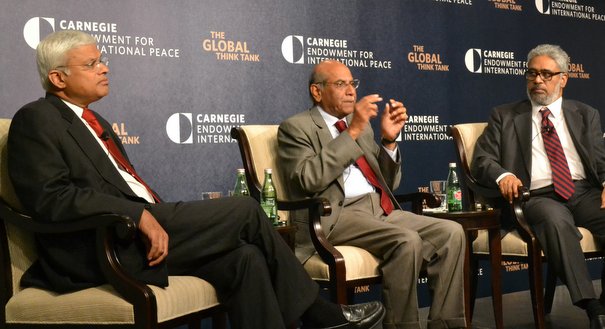Registration
You will receive an email confirming your registration.
The Carnegie Endowment for International Peace hosted a conference on how the United States and India can collaborate to create an economic environment and institutional regime that protects innovation. The event reviewed the continuing transformation in bilateral relations, examined the innovative licensing model recently implemented in India by Gilead Sciences, and discussed how the two countries can collaborate to protect their future as innovation societies. Peter Lavoy, National Security Council Senior Director for South Asian Affairs, provided keynote remarks.
The Carnegie Endowment is grateful for the support of Gilead Sciences in making this event possible.
The U.S.-India Relationship–Past, Present, and Future
How can the history of the U.S.-Indian bilateral relationship enhance understanding of its current status?
William J. Burns, president of the Carnegie Endowment for International Peace, introduced the conference. Then Carnegie’s C. Raja Mohan led a panel discussion that focused on the various shared interests of the United States and India, as well as the potential future direction of the relationship and how to avoid obstacles that could prevent better relations. He was joined by Shyam Saran, former foreign secretary of India, and Carnegie’s Ashley J. Tellis.
C. Raja Mohan
Nonresident Senior Fellow, Carnegie India
William J. Burns
President
Shyam Saran
Ashley J. Tellis
Tata Chair for Strategic Affairs
Exploring the Gilead-India Licensing Partnership Model
The second panel of the conference focused on the details of Gilead’s approach to providing affordable healthcare in India without threatening intellectual property rights.
The second panel of the conference focused on the details of Gilead’s approach to providing affordable healthcare in India without threatening intellectual property rights. Rajiv Kumar moderated the panel, which featured Gregg H. Alton, James Love, Kiran Mazumdar-Shaw, and Dilip Shah.
Kiran Mazumdar-Shaw
Rajiv Kumar
Dilip Shah
Gregg Alton
James Love
The Future of Cooperation on Innovation
How could the Gilead model be applied by other companies, and what policies might foster innovation in the United States and India in different industries?
In the third panel of the conference, Ajay Chhibber, Tarun Das, and V. Kasturi Rangan discussed how the Gilead model could be applied by other companies, and what policies might foster innovation in the United States and India in different industries.
Tarun Das
Ajay Chhibber
V. Kasturi Rangan
